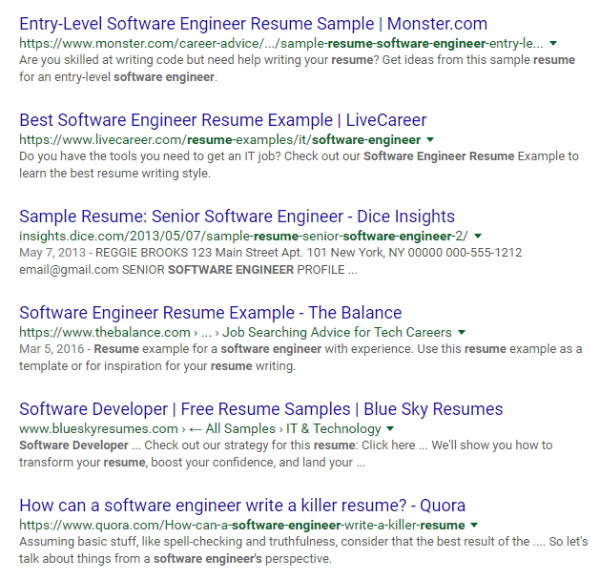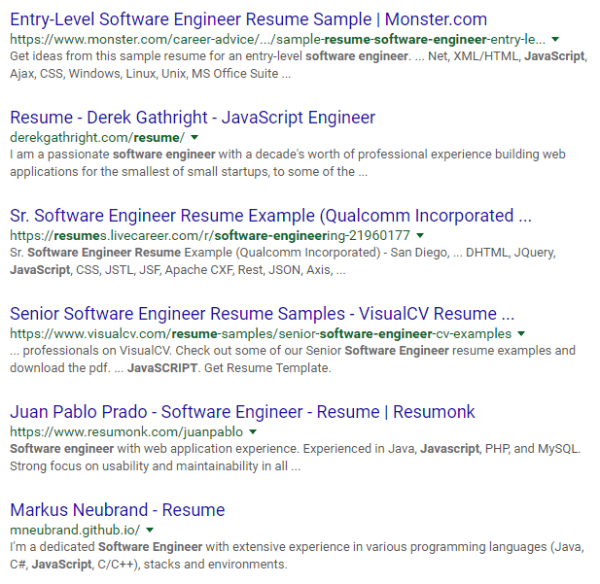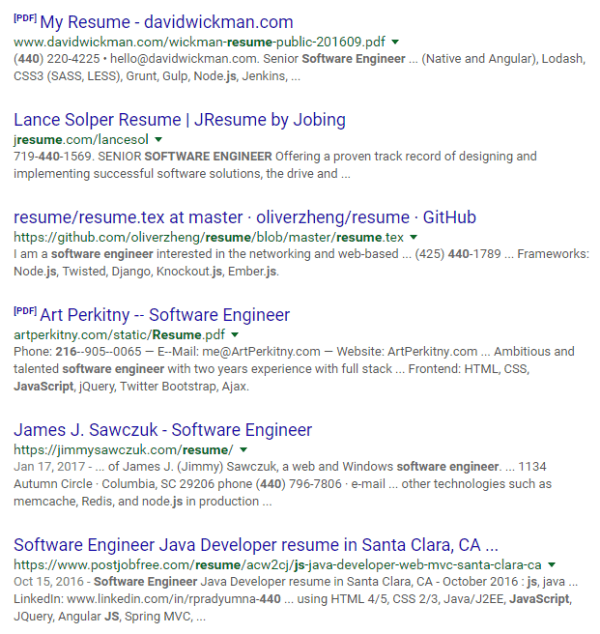Finding candidates through a Google search is a powerful recruitment sourcing strategy, but can take a lot of time. You can sift through pages of Google resumes and irrelevant results just to find one promising candidate.
You might have to look at hundreds or thousands of results that don’t match your job orders. You’re a busy recruiter. I’m sure you’d rather spend time making placements instead of staring at Google search resumes for hours.
Luckily, there are ways to improve your searches and cut down on wasted time. By being strategic about what you type into Google, you can get relevant results that will help you fill jobs faster.
Starting the Internet resume search
The first step of finding candidates through Google is uncovering resumes.
Let’s say you’re looking for software engineers. Sure, you can simply type in software engineer resume, but that’s going to get you a lot of junk results. You’re going to pull up a lot of results for samples, examples, templates, and writing tips.
Here’s an example of what you might find:
That search turned up almost three million results. I had to go through 70 results before I found an actual, real resume. And, the pages after were still jam-packed with useless results. See how much time you could be wasting?
How to search for resumes on Google
You can narrow down the search results a little bit by searching only for results that have resume in the title or URL.
You can do this by using intitle: and inurl: search operators. The first (intitle:) will find sites that have your search term in the page title, and the second (inurl:) will find sites that have your search term in the URL. Do not put a space after the operators.
In this case, you might type in something like this: (intitle:resume OR inurl:resume)
The OR operator in the middle will give you results that have either resume in the title or the URL.
Here’s an example of what will show up:
Searching (intitle:resume OR inurl:resume) alone will not pull up the software engineer resumes you’re looking for. It’ll actually show you more results than the narrower software engineer resume search. You need to add and exclude information from your search to get what you’re looking for.
Including information in your Google resume search
If you have a position you’re trying to fill, take a look at the job description. Using the job description as the starting point of your recruiting process is just as valuable in a Google resume search as any other sourcing method. Take note of the job title and the desired skills and experience. Those can become search terms to narrow down the results Google gives you.
Back to our example looking for software engineers. Skills and experience in the job description might include:
- Computer science degree
- C#, C++, PHP
- JavaScript, jQuery
- Developer
Adding these terms to your search will narrow down the results. For example, search (intitle:resume OR inurl:resume) “software engineer” JavaScript. You will see results for sites that have resume in the title or URL, and the sites also mention software engineer and JavaScript.
Did you notice “software engineer” is in quotes? Putting quotes around something tells Google to find an exact match for the term, instead of breaking it up. Without the quotes, Google would search for software and engineer separately, too.
Here’s what the results of our search look like:
As you can see, there are some resumes for software engineers. (And, on page one!) But, there are still a lot of results for resume examples. This time, there are 204,000 results. That’s fewer results than before, but still a lot to sort through.
To filter out the excess results, you need to exclude things from your results.
Excluding information from your Internet resume search
To get rid of those sample resumes, let’s modify the search. You can use the minus (–) sign to prevent things from showing up in the results. Do not put a space after the minus sign.
In this case, we want to remove sample resumes, so we might try something like this:
(intitle:resume OR inurl:resume) “software engineer” JavaScript -sample -example -template
These results look more promising:
Now there are only 36,500 results. That’s a lot better than three million.
We can narrow down the Google search resume results even more by targeting our search to a specific location.
Targeting locals
There are several methods you can use to find Google resumes of people in a specific location. You can use these methods alone or together to find the results you need.
Area codes
Let’s start with area codes. Some people put their phone number on their resume. By adding a phone number area code when you do a Google resume search, you can find people clustered in a location.
For example, let’s say you want to find software engineers who live in or near Cleveland, Ohio. You will add the local area codes to your search. It might look like this:
(intitle:resume OR inurl:resume) “software engineer” JavaScript -sample -example -template (216 OR 440)
And here’s what the results look like:
This search narrowed the results down to 764. Much more manageable and targeted to your needs.
There are downsides to searching by area code. First, Google doesn’t know you are specifically searching for area codes. It’ll just pull up results that happen to have the numbers 216 or 440 in them. While you will see results with those area codes, Google also displays phone numbers that have those numbers in any location. You’ll also see results that happen to have those numbers somewhere else besides phone numbers.
Second, area codes don’t always tell you where a person is located. A person could get a phone number in Cleveland, Ohio and then move to a different location. You’ll need to look at other information on the resume to determine the person’s location.
Zip codes
You can use zip codes to help you track down candidates who live in a certain area. Like area codes, Google doesn’t know you are looking specifically for zip codes. But, you can search for a number or a range of numbers.
There is a Google search operator (..) that lets you search a range of numbers. For example, if you type in 10..30, Google will search all the numbers from 10 to 30. Now, you just have to do this with zip codes to search all the numbers between the highest and lowest zip codes.
To do this, you’ll need a central zip code, most likely the zip code of the business you are finding a candidate for. Let’s use the Cleveland zip code of 44115.
Next, you need to create a radius and find all the zip codes in that radius. Many online zip code lookup sites let you search all the zip codes within a specific area. For this example, let’s use a 30-mile radius from 44115. Find the smallest and largest numbered zip codes. In this case, they are 44011 and 44398.
Now, you can add the range of zip codes to your search:
(intitle:resume OR inurl:resume) “software engineer” JavaScript -sample -example -template 44011..44398
Here are the results from that search:
Only 10 results showed up for this search, the smallest and most targeted yet. You can expand your search to find more results.
State name
If you’re looking for someone within a certain state, you can add the state name or postal code to your search.
In the example we’re using, the search might look like this:
(intitle:resume OR inurl:resume) “software engineer” JavaScript -sample -example -template (Ohio OR OH)
As you can see, the results are more targeted to the State of Ohio:
You can also use this method to search for a city. However, searching by city might give you more irrelevant results because there are many cities and towns by the same name across the U.S.
Extra tips for your Google resume search
When doing a Google resume search, you can use any combination of the methods above. There is not one right way to find resumes via web search. Depending on how niche the job opening is or how specific the location is, you will need to try multiple methods to find the candidates you want.
Also, feel free to play with the methods mentioned above. There are unlimited examples of how to search resumes in Google, and you might find a combination that works especially well for your recruiting niche. You are not limited to the specific search terms used in the examples. You can add more skills to your search. You can also exclude more or different terms. You can use multiple location tools at one time. What you type in is based on your needs.
You might want to consider resumes that don’t include the word resume in the title or URL. You might try different terms, such as curriculum vitae or CV. You might also want to search for common words found on resumes, such as summary, employment, skills, education, or experience.
The Internet resume search software solution
Once you find the resumes, what can you do with them then? Well, life becomes much easier when you have an Internet resume search software like Top Echelon’s applicant tracking system. Top Echelon’s recruiting software allows you to easily organize your resumes through its powerful and robust and powerful resume parsing capabilities.
Top Echelon’s elite ATS boasts two parsing tools that can make your life easier as a recruiter. The first one is its Resume Parser, which pulls important information from the resume. This information includes the following, among other things:
- Contact information
- Work history
- Education
- Certifications
- Customized tags
Once this is complete, you can view and compare job candidates quickly. Not only that, but you can also track them through every stage of the recruiting process, using the Internet resume search software’s powerful candidate and keyword searching capabilities. For example, you can search specifically on the following things, to name just a few:
- Experience
- Geographic location
- Education
- Skills
The first parsing tool available through Top Echelon’s applicant tracking system for recruiters is the Email Parser, which allows you to quickly take an email with a resume attached and send or forward it right into your database. That’s the good news. Here’s the better news: you can email parse up to 20 resumes per email, and Top Echelon’s Internet resume search software will automatically check for duplicate records within your database. And, in a situation where the software does find a duplicate record, you’ll have the choice of updating the existing record or simply leaving it as it is and simply notifying you that a duplicate record was found.
Sourcing and finding top talent through a Google resume search is just the first step, regardless of whether you’re a professional recruiter or search consultant or a corporate recruiter or HR representative. Once you’ve done that, then you must successfully engage and then recruiter that talent in the hopes that you can get these candidates to consider your employment opportunity.
If you’re a professional recruiter or search consultant, Top Echelon has an applicant tracking software that can help you to recruit top talent and place the best candidates on a consistent basis. And this software offers a ton of great features, including the Parser and the Email Parser . . . but it doesn’t stop there!
That’s because you can get 15 days of our powerful Internet resume search software for FREE! Keep in mind that this is the full version of the software, not a limited version like some packages provide when they offer a free version. In addition, you do NOT need a credit card to start the trial. Once again, this is unlike some other software packages, which want you to enter your credit card number before they will provide something for “free.”
Click HERE to start your free 15-day trial of the best applicant tracking system for recruiters who want to find the best talent on the Internet! (Or anywhere else, for that matter.)
How much our recruitment software cost?
Top Echelon’s recruitment software is one of the most affordable solutions available, as well, and there’s a good reason for that. The cost is just is just $59.50 per user per month when you choose the annual pricing plan. (This is opposed to the monthly pricing plan, which is $70 per user per month.)
However, we understand that you may not want to sign up for a free trial just yet, even if that free trial does not require a credit card number. As such, we also offer a live demonstration of our software. During this demonstration—or demo—one of our software specialists will show you the features and answer all of your questions. (About the software, that is. Not about the universe or the meaning of life . . . unless you get the right specialist.)
Click HERE to request a live demo of Top Echelon’s Internet resume search software for recruiters!








